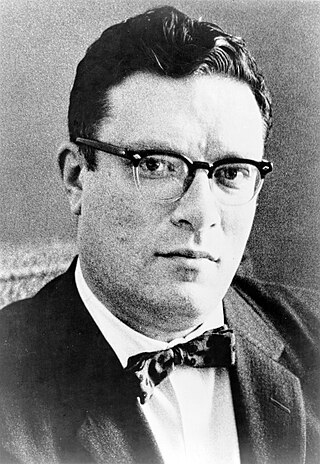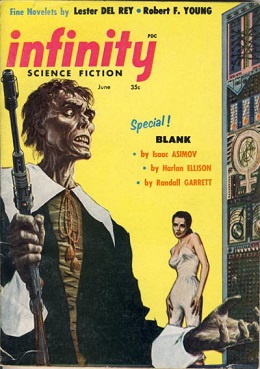
Isaac Asimov was an American writer and professor of biochemistry at Boston University. During his lifetime, Asimov was considered one of the "Big Three" science fiction writers, along with Robert A. Heinlein and Arthur C. Clarke. A prolific writer, he wrote or edited more than 500 books. He also wrote an estimated 90,000 letters and postcards. Best known for his hard science fiction, Asimov also wrote mysteries and fantasy, as well as popular science and other non-fiction.

Janet Opal Asimov, usually writing as J. O. Jeppson, was an American science fiction writer, psychiatrist, and psychoanalyst.

The Gods Themselves is a 1972 science fiction novel written by Isaac Asimov, and his first original work in the science fiction genre in fifteen years. It won the Nebula Award for Best Novel in 1972, and the Hugo Award for Best Novel in 1973.

Buy Jupiter and Other Stories is a 1975 collection of short stories by American writer Isaac Asimov. Each story is introduced by a short account of how it came to be written and what was happening in Asimov's life at the time, and follows on from where The Early Asimov (1972) left off. In the introduction, Asimov explains that his objective is to tell enough of his autobiography in his short story collections so that his editors will stop asking him to write an actual autobiography.
"Shah Guido G." is a science fiction short story by American writer Isaac Asimov. It was first published in the November 1951 issue of Marvel Science Fiction and reprinted in the 1975 collection Buy Jupiter and Other Stories, where Asimov explains his love of puns. It is an example of a shaggy dog story, as indicated by the title.
"Victory Unintentional" is a humorous science fiction short story by American writer Isaac Asimov, published in the August 1942 issue of Super Science Stories and included in the collections The Rest of the Robots (1964) and The Complete Robot (1982).
"Not Final!" is a science fiction short story by American writer Isaac Asimov, originally published in the October 1941 issue of Astounding Science Fiction, and included in the 1972 collection The Early Asimov. Its sequel, "Victory Unintentional", is a robot story. These are two of the few stories by Asimov to postulate non-human intelligences in the Solar system.

Fact and Fancy is a collection of seventeen scientific essays by American writer and scientist Isaac Asimov. It was the first in a series of books collecting his essays from The Magazine of Fantasy and Science Fiction, and Asimov's second book of science essays altogether. Doubleday & Company first published it in March 1962. It was also published in paperback by Pyramid Books as part of The Worlds of Science series.
"Buy Jupiter!" is a humorous science fiction short story by American writer Isaac Asimov. It was first published in the May 1958 issue of Venture Science Fiction Magazine, and reprinted in the 1975 collection Buy Jupiter and Other Stories. The original title of the story was "It Pays," though it was never published under this name.

"Founding Father" is a science fiction short story by American writer Isaac Asimov. It was first published in the October 1965 issue of Galaxy Science Fiction, and reprinted in the 1975 collection Buy Jupiter and Other Stories. It was inspired by a cover painting of a space-helmeted face backed by several crosses, provided by the magazine's editor, Frederik Pohl.
"Take a Match" is a science fiction short story by American writer Isaac Asimov. It was first published in Robert Silverberg's 1972 anthology New Dimensions II and reprinted in the 1975 Asimov collection Buy Jupiter and Other Stories.

"Waterclap" is a science fiction short story by American writer Isaac Asimov. The story was written at the request of a movie company and was intended to serve as the basis of a film treatment. The author did not want to do the story, and only met with the studio representative as a favor to his publisher, which had already accepted an advance payment for it. When the representative outlined the plot and characters, Asimov knew he could not write such a story, but did not want to refuse at a dinner the film studio was paying for. The draft he wrote did not follow the requested approach. The story was rejected by the studio, and the advance returned at Asimov's request. A later draft was published in the April 1970 issue of If and was reprinted in the 1976 collection The Bicentennial Man and Other Stories.
"Light Verse" is a science fiction short story by American writer Isaac Asimov. It was first published in the September–October 1973 issue of The Saturday Evening Post. It later appeared in the collections Buy Jupiter and Other Stories (1975), The Complete Robot (1982), and Robot Dreams (1986). The author has reported that he wrote the initial draft in one session and later had to change hardly a word in the final revision.
"Each an Explorer" is a science fiction short story by American writer Isaac Asimov. It was written in June 1956 and first published in issue #30 of Future Science Fiction. It was also reprinted in the 1975 collection Buy Jupiter and Other Stories.

"Rain, Rain, Go Away" is a short story by American writer Isaac Asimov. A fantasy/horror story, it was based on an idea by Bob Mills, editor of The Magazine of Fantasy and Science Fiction, but rejected by him. It was instead published in the September 1959 issue of Fantastic Universe and reprinted in the 1975 collection Buy Jupiter and Other Stories.

"Blank!" is a science fiction short story by American writer Isaac Asimov. It was commissioned by Larry Shaw, editor of Infinity Science Fiction, as being the least inspirational title on which to base a story. Harlan Ellison and Randall Garrett were also invited to submit stories based on the same title; Garrett wrote one with "Blank?" as the title while Ellison submitted "Blank." All three were published in the magazine in June 1957. Asimov's story was later reprinted in the 1975 collection Buy Jupiter and Other Stories.
"Exile to Hell" is a science fiction short story by American writer Isaac Asimov. It appeared in the May 1968 issue of Analog Science Fiction and Fact and was included in the 1975 collection Buy Jupiter and Other Stories.
"The Greatest Asset" is a science fiction short story by American writer Isaac Asimov. It was written as a counterpoint to his story "2430 A.D." with the intention of refuting, rather than illustrating, the same quotation by writer and social commentator J. B. Priestley from his 1957 book Thoughts in the Wilderness. It was published in the January 1972 issue of Analog and reprinted in the 1975 collection Buy Jupiter and Other Stories.
In a writing career spanning 53 years (1939–1992), science fiction and popular science author Isaac Asimov (1920–1992) wrote and published 40 novels, 383 short stories, over 280 non-fiction books, and edited about 147 others.
Isaac Asimov wrote three volumes of autobiography. In Memory Yet Green (1979) and In Joy Still Felt (1980) were a two-volume work, covering his life up to 1978. The third volume, I. Asimov: A Memoir (1994), published after his death, was not a sequel but a new work which covered his whole life. This third book won a Hugo Award.








